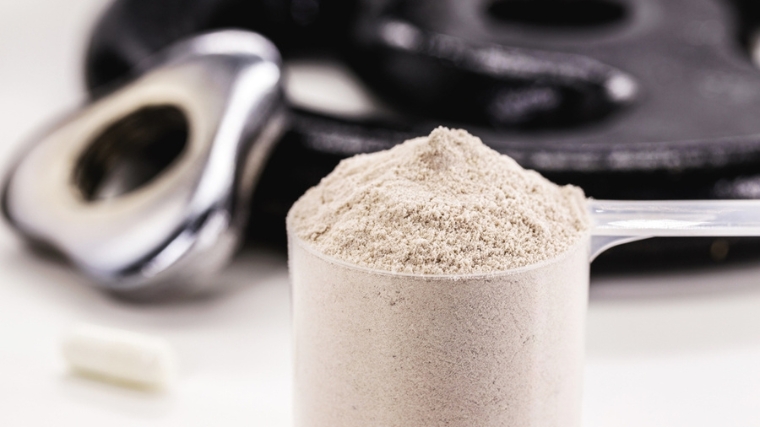When it comes to evidence-based supplements, creatine tops the charts as one of the most effective ways to improve your performance both in the gym and on the track. Not only is it considered safe for just about anyone to take on a consistent basis, creatine is also touted for its potential benefits to brain health in certain populations, and even possibly reducing age-related muscle loss.
Despite its great track record, some people avoid using creatine because they’re worried about the potential for unwanted weight gain. Just a fraction of a pound could change the circumstances for a weight-class-bound athlete, and people pursuing weight loss would be understandably flustered by a sudden uptick on the scale.

So, it begs the question — are the performance-related gains worth the weight gain, and is there anything you can do about it?
Editor’s Note: The content on BarBend is meant to be informative in nature, but it should not be taken as medical advice. When starting a new training regimen and/or diet, it is always a good idea to consult with a trusted medical professional. We are not a medical resource. The opinions and articles on this site are not intended for use as diagnosis, prevention, and/or treatment of health problems. They are not substitutes for consulting a qualified medical professional.
What Is Creatine?
Creatine is an organic compound that can be formed in the body (mostly in the kidneys and liver) with reactions involving the amino acids arginine, glycine, and methionine. Most of the body’s creatine stockpile is stored in skeletal muscle as creatine phosphate, where it powers intense exercise by donating its phosphate group to adenosine diphosphate (ADP) to replenish adenosine triphosphate (ATP). (1)
In simple terms, creatine helps you produce, regulate, and apply your energy stores more efficiently. It isn’t an energy source itself, but it augments the processes that power high-intensity training.
Sources of Creatine
Creatine can also be obtained from the diet (in small amounts) via meat consumption or, more commonly, supplementation. Though it’s sold in different forms, creatine monohydrate appears to be the superior (and usually more cost-effective) choice for external supplementation due to its bioavailability and long-term stability at room temperature. (1)
Does Creatine Make You Gain Weight?
Every cell in your body carefully regulates its balance of water among other substances like electrolytes, proteins, and creatine. This ensures that the cells don’t burst or shrivel, and that your body maintains appropriate electrolyte concentrations to enable your nervous system to function properly.

Creatine is an osmotically-active substance, which means it causes water to enter cells when it’s absorbed. Skeletal muscle cells can’t make their own creatine, so they have to absorb it from the blood via a sodium-dependent transporter, which leads to both sodium and water uptake. (1) The consequential water retention from creatine supplementation both bolsters your performance and typically leads to a higher number on the scale.
Creatine Loading Might Cause Water Retention
Some studies have shown that creatine loading (that is, taking extra-high doses of creatine beyond the standard daily five-gram prescription in an attempt to quickly accumulate a sufficient reserve) can cause weight gain (of anywhere from one to six pounds) by elevating total body water content. (1)(2)(3)
In a recent study on repeated sprint performance, the initial weight gain from creatine supplementation correlated with improvements in power output, which might indicate that individuals who notice some weight gain are also likely to notice some benefits. (4)
However, other short and long-term studies haven’t backed this finding up, which could mean that total body water content normalizes over time and may not play a role in the benefits of continued supplementation. (1) As usual, more research is needed, but an uptick in scale weight could mean that your creatine supplement is starting to take effect.
Creatine Could Help You Gain Muscle Mass
Since creatine supplementation can help you pump out a few more reps in the gym, long-term supplementation could also lead to slightly more muscle gain over time, given the right training and nutrition conditions. (5)(6) You’re not likely to notice this in the short term, but if you supplement creatine for a long period of time, it can contribute to weight gain from muscle.
How to Prevent Creatine Weight Gain
Weight gain isn’t inherently negative or positive, and creatine-associated water retention is a protective mechanism meant to maintain homeostasis (and might even play some role in creatine’s initial benefits).
That said, a startling jump on the scale could cause some confusion if you’re pursuing fat loss or impact your preparation for competition if you compete in a sport that has defined weight categories. (1)

It’s important to note that the rapid weight gain associated with creatine supplementation — if it happens at all — is due to water retention and not fat or muscle gain, necessarily. (1) If it makes macronutrient adjustments more challenging, however, one option would be to start supplementation before making any dietary changes in order to prevent this factor from affecting your weight-related data.
If you’re a weight-class athlete planning to compete in a specific division, you might want to avoid starting creatine (particularly, a loading phase) close to your weigh-ins. The temporary water retention and subsequent increase in scale weight might accidentally bump you out of your desired category.
Are There Other Side Effects of Creatine?
Contrary to popular belief, creatine doesn’t cause notable abdominal bloating, hair loss, or kidney damage, though large doses (greater than 10 grams per serving) often used in loading phases could cause gastrointestinal distress.
Creatine is considered safe and beneficial for children, adolescents, adults, and older people for both sport performance and many other aspects of general health. (1)(3)
What Are the Benefits of Creatine?
Creatine provides an impressive number of sport-and health-related benefits! Though it’s commonly promoted as a supplement for weight lifters, its ability to replenish ATP makes it a valuable inclusion in your regimen even if you don’t hit the iron on a regular basis.
Creatine Powers Intense Exercise
Research shows that creatine can improve power, increase your tolerance of failure-adjacent resistance training, and augment repeated sprint performance, which all translate to more exercise volume in the gym. Over time, training harder and longer should result in better performance markers and additional muscle mass. (1)(2)(4)(5)(6)
Creatine Supports Muscle Growth and Recovery
Creatine supports muscle growth and reduces muscle protein breakdown by modifying protein synthesis, inflammation, and oxidative stress, which could benefit athletes as well as individuals focused on preventing age-related muscle loss. (1)(4)(5)(6)(7)

It’s also thought to facilitate glucose uptake, providing muscle cells with another source of energy during exercise, or enhancing glycogen storage post-workout so you feel restored and ready to put in the work at your next training session. (1)
Creatine Could Support Brain Health in Certain Populations
A growing body of evidence suggests that the benefits of creatine supplementation aren’t limited to skeletal muscle or sports performance; creatine could actually benefit your brain in some cases, too.
Brain cells require creatine to function properly, especially during times of high energy demand (think complex task performance or while recovering from an injury). Creatine helps to regulate oxidative stress in both muscle and brain cells by maintaining functional mitochondria. (8)
Creatine supplementation could preserve some neuronal function, attention, working memory, and cognitive function in people who are suffering from sleep deprivation (though it won’t completely preserve sport-related performance if you haven’t been catching your zzz’s.) (8)
Some contemporary, albeit limited in scope, research suggests that creatine might also support recovery after a traumatic brain injury, like a concussion, though this has primarily been studied in adolescents. (9)(10)
Creatine has also been shown to enhance the effects of prescription medications for major depressive disorder and bipolar disorder, but more research is needed to determine the effective dosing protocol. (11)(12) At minimum, it’s an encouraging bit of science to keep an eye on.
The Case for Creatine
Given the numerous health and performance benefits, creatine supplementation is a smart choice regardless of its potential to cause a little bit of water retention. While it might cause you to gain a few pounds of “water weight,” body water levels are tightly regulated, and needn’t concern you if you start scooping. Creatine’s ability to increase the water content in your muscle cells might even predict how well you will respond to supplementation.
However, if you track your body weight closely for a powerlifting or weightlifting meet (or any other weight-bound sport), you might want to factor in this “side effect” of creatine before taking the plunge. That doesn’t mean you should skip out on creatine entirely, though — a few pounds on the scale are more than worth the miles on the track or extra reps under the bar.
References
- Antonio, J., Candow, D. G., Forbes, S. C., Gualano, B., Jagim, A. R., Kreider, R. B., Rawson, E. S., Smith-Ryan, A. E., VanDusseldorp, T. A., Willoughby, D. S., & Ziegenfuss, T. N. (2021). Common questions and misconceptions about creatine supplementation: what does the scientific evidence really show? Journal of the International Society of Sports Nutrition, 18(1), 1–17.
- Moore, S. R., Gordon, A. N., Cabre, H. E., Hackney, A. C., & Smith-Ryan, A. E. (2023). A Randomized Controlled Trial of Changes in Fluid Distribution across Menstrual Phases with Creatine Supplementation. Nutrients, 15(2), 429.
- Deminice, R., Rosa, F. T., Pfrimer, K., Ferrioli, E., Jordao, A. A., & Freitas, E. (2016). Creatine Supplementation Increases Total Body Water in Soccer Players: a Deuterium Oxide Dilution Study. International journal of sports medicine, 37(2), 149–153.
- Bogdanis, G. C., Nevill, M. E., Aphamis, G., Stavrinou, P. S., Jenkins, D. G., Giannaki, C. D., Lakomy, H. K. A., & Williams, C. (2022). Effects of Oral Creatine Supplementation on Power Output during Repeated Treadmill Sprinting. Nutrients, 14(6), 1–14.
- Mills, S., Candow, D. G., Forbes, S. C., Neary, J. P., Ormsbee, M. J., & Antonio, J. (2020). Effects of creatine supplementation during resistance training sessions in physically active young adults. Nutrients, 12(6), 1–11.
- Feuerbacher, J. F., von Schöning, V., Melcher, J., Notbohm, H. L., Freitag, N., & Schumann, M. (2021). Short-Term Creatine Loading Improves Total Work and Repetitions to Failure but Not Load-Velocity Characteristics in Strength-Trained Men. Nutrients, 13(3), 826.
- Doma, K., Ramachandran, A. K., Boullosa, D., & Connor, J. (2022). The Paradoxical Effect of Creatine Monohydrate on Muscle Damage Markers: A Systematic Review and Meta-Analysis. Sports Medicine, 52(7), 1623–1645.
- McMorris, T., Harris, R. C., Howard, A. N., Langridge, G., Hall, B., Corbett, J., Dicks, M., & Hodgson, C. (2007). Creatine supplementation, sleep deprivation, cortisol, melatonin and behavior. Physiology and Behavior, 90(1), 21–28.
- Sakellaris, G., Nasis, G., Kotsiou, M., Tamiolaki, M., Charissis, G., & Evangeliou, A. (2008). Prevention of traumatic headache, dizziness and fatigue with creatine administration. A pilot study. Acta Paediatrica, International Journal of Paediatrics, 97(1), 31–34.
- Sakellaris, G., Kotsiou, M., Tamiolaki, M., Kalostos, G., Tsapaki, E., Spanaki, M., Spilioti, M., Charissis, G., & Evangeliou, A. (2006). Prevention of complications related to traumatic brain injury in children and adolescents with creatine administration: An open label randomized pilot study. Journal of Trauma – Injury, Infection and Critical Care, 61(2), 322–329.
- Toniolo, R. A., Silva, M., Fernandes, F. de B. F., Amaral, J. A. de M. S., Dias, R. da S., & Lafer, B. (2018). A randomized, double-blind, placebo-controlled, proof-of-concept trial of creatine monohydrate as adjunctive treatment for bipolar depression. Journal of Neural Transmission, 125(2), 247–257.
- Yoon, S., Kim, J. E., Hwang, J., Kim, T. S., Kang, H. J., Namgung, E., Ban, S., Oh, S., Yang, J., Renshaw, P. F., & Lyoo, I. K. (2016). Effects of Creatine Monohydrate Augmentation on Brain Metabolic and Network Outcome Measures in Women With Major Depressive Disorder. Biological Psychiatry, 80(6), 439–447.
Featured Image: RHJPhtotos / Shutterstock